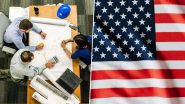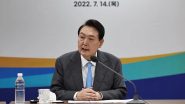Washington, Sep 29 (PTI) In light of the massive trade tariffs imposed by the US on import of Chinese products, leading experts have expressed vastly divergent views on the prospect of a US-China trade war, with the Chinese insisting that existing arrangements have enhanced prosperity in both the countries.
"We have yet to see China fully liberalise or open its markets to American investors," said Ken Weinstein, president of Washington-based Hudson Institute, at a dialogue with scholars from Beijing's Center for China and Globalisation.
Weinstein cited "serious issues in the US-China relationship," including "intellectual property theft, the role of heavily subsidised state-owned enterprises tied in some cases to the People's Liberation Army and ministries, trade undertakings for strategic purposes, below market costs, dumping of products, there is a long list of issues we are here to discuss on the American side."
CCG President Huiyao Wang said both the countries had received benefits from their close ties over the past 40 years and hoped that the Trump administration will build on those gains instead of changing the situation.
"In the past, the United States played a positive role in China's reform and opening up," Wang said.
"Since China joined WTO, US exports to China have increased by 500 per cent, far exceeding the 90 per cent increase in US global exports over the same period," he added.
"China has become the second largest destination for US exports and US enjoyed a trade surplus in services of US USD 53 billion over China" in 2017, which could be lost amidst threats of a trade war, the Chinese scholar said.
The head of Hudson Institute's Center on China Studies, Michael Pillsbury, said the Chinese scholars made "China's case in great detail" but it was "not enough" to address the concerns voiced by US President Donald Trump about trade ties.
Former Pakistani ambassador to the US, Husain Haqqani, who is director for South and Central Asia at Hudson Institute said the problem in China-US relations stems from the huge gap in transparency levels in the two countries' political systems.
"Chinese scholars cited American trade organisations and members of Congress who disagree with President Trump but we cannot engage with Chinese critics of President Xi's policies," he quipped.
Haqqani said lack of transparency on China's part raised questions about rules and laws in China being applied evenly to everyone. "Chinese companies coerce their joint venture partners into sharing technology, denying American companies the advantage of innovation," he said by way of example.
According to Haqqani, China concealed strategic ambitions under its economic activity and some of its initiatives did not make economic sense, raised doubts China must address.
He cited the example of China's interest in the Maldives and Sri Lanka, and said, "These are not economic or trade-based decisions. These are strategic moves aimed at gaining advantage in the Indian Ocean region."
(This is an unedited and auto-generated story from Syndicated News feed, LatestLY Staff may not have modified or edited the content body)












 Quickly
Quickly



















